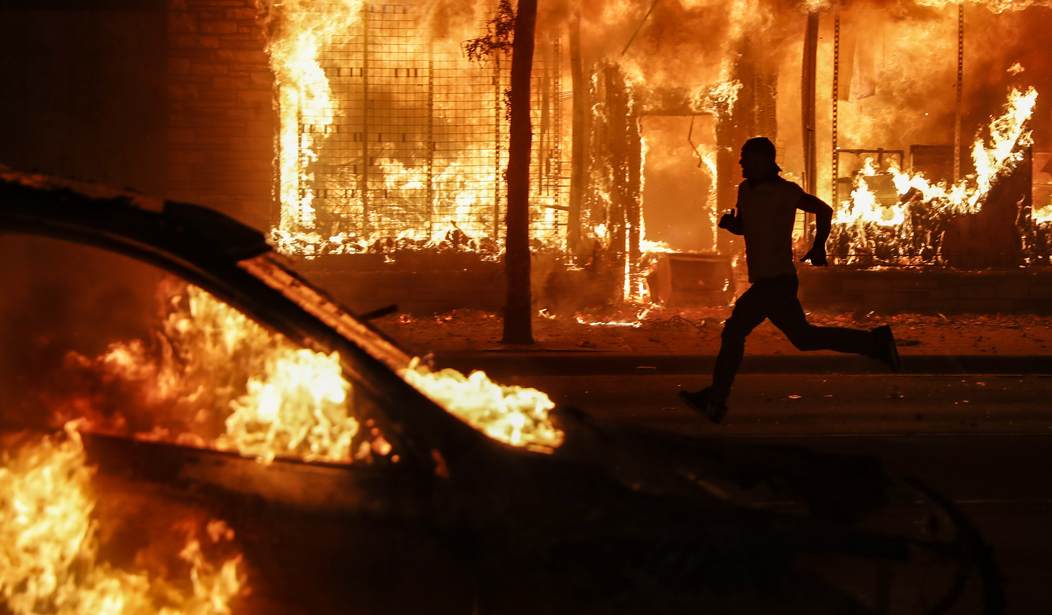The killing of George Floyd was outrageous and inexcusable. Those responsible -- especially the ex-officer who put his knee on Floyd's neck for nearly nine minutes, including three minutes after the handcuffed man became unresponsive -- should face justice. 'A few bad apples' retorts to serious questions about systemic abuses ring hollow. As millions of Americans of all races and political ideologies express righteous anger over what happened in Minneapolis (and Louisville), and demand change, there have been some voices with large platforms who have sought to justify or downplay rioting and looting. They've done so by noting that businesses have insurance and arguing that such violent upheaval 'only' involves property damage, which can be replaced and repaired, unlike human lives.
This is facile and destructive. It's true that large companies like Target and Auto Zone are insured and have the resources to overcome setbacks like individual stores getting ransacked and burned. But what about, say, a Somali-American man who has worked extremely hard at a local big box store in the Twin Cities for years, slowly climbing the ranks and becoming a manager? He has a family to feed, and the last few months have been stressful enough, in light of the pandemic. What happens to his job and income? How long does the insurance claim take to process? When does the rebuilding begin? When might the store realistically reopen? What about the black-owned small businesses that were destroyed by rioters, like these?
“‘I don’t know what we’re going to do,’ Balla said [to CBS]. ‘It hurts, man. It’s not fair, it’s not right. We’ve been working so hard for this place. It’s not just for me, it’s for my family.’ Balla’s wife Tywanna said that the bar was not insured.” https://t.co/3Hqez8IMyR
— Guy Benson (@guypbenson) May 30, 2020
Katherine Mahmoud is furious about George Floyd's death — but she's also angry at those who destroyed her family's Milwaukee cellphone shop as protests escalated early Saturday morning. https://t.co/9Mx0Z1dLQH via ?@BillGlauber?
— Molly Beck (@MollyBeck) May 30, 2020
A black firefighter with four kids spent his life savings to open up a bar that got wrecked in the riots. In the very community he's served so faithfully. Thankfully, his story received national attention, and his GoFundMe account has attracted hundreds of thousands of dollars in donations, but many other businesses will not be so fortunate. How are they supposed to pick up the pieces? And what does the 'just property damage' brigade say to this scared and heartbroken woman?
MUST WATCH TV: If you’re still unclear what impact the rioting and violence is having on the most vulnerable among us, please listen to Stephanie, a disabled Minneapolis woman who offers her heart-wrenching experience after last night’s violence. Great work by ?@BenryNews? pic.twitter.com/k73Q65Psvs
— Tom Hauser (@thauserkstp) May 30, 2020
Recommended
She was not physically harmed, but her community is in shambles. Try telling her it's not too big of a deal. Beyond the ripple effects and residual impacts of the damage caused by rioting, the commission of "mere" property damage crimes often runs a high risk of spinning further out of hand and also causing physical harm. The videos and reports of assaults, severe beatings (content warning), shootings and deaths are gut-wrenching:
#BREAKING: The Federal Protective Service officer who died Friday night after suffering from a gunshot wound in #Oakland amid protests has been identified as 53-year-old Patrick Underwood of Pinole, according to a family member.
— KRON4 News (@kron4news) May 31, 2020
Read more: https://t.co/qHDechu2nK pic.twitter.com/Orzzgl1W4X
INDIANAPOLIS (AP) - Police: 'Multiple shootings' in downtown #Indianapolis amid protests; one person killed.
— Matt Lee (@APDiploWriter) May 31, 2020
At least seven people were shot as protesters in Louisville demonstrated against the killing of Breonna Taylor, a black woman fatally shot by police in her home in March. https://t.co/XnF9PKVDqM
— The Associated Press (@AP) May 29, 2020
When tensions run exceedingly high, and emboldened, escalatory mobs engage in non-peaceful acts, human lives can get caught in the wreckage. There must be a bright line drawn between needed, constructive, peaceful protest, and rioting. Here's part of New York Times columnist Ross Douthat's latest piece:
The political history of both the 1960s and the 2010s suggests a strong presumption against the political effectiveness of looting or vandalism or arson, to go along with the direct costs for the communities where riots are most likely to break out...For radicals, this presumption doesn’t require shedding tears for the insurers of, say, a ransacked Minneapolis Target. It just requires recognizing that most spasms of robbery or arson aren’t the revolution but often a ritual reaffirmation of the status quo — a period of misrule that doesn’t try to establish an alternative order or permanently change any hierarchies, as a true revolution would, but instead leaves the lower orders poorer and the well-insured upper classes more or less restored...Martin Luther King Jr. became more politically radical in his last years, but his opposition to rioting was a constant. “Every time a riot develops,” he warned just months before his death, “it helps George Wallace.”
It has been interesting to watch the rapid evolution of certain people who've gone from effectively defending riots, including agitating against the word 'riot,' to ludicrously attempting to blame the riots on narrative-friendly forces. It's audacious gaslighting, designed to deflect responsibility for moral failures and leadership failures. Fortunately, there are some leaders who clearly recognize the poisonous effects of rioting, and who refuse to play make-believe about who is driving the violence:
Powerful words: Atlanta Mayor Keisha Lance Bottoms (via everyone) pic.twitter.com/tniX6jC3Ha
— Justin Stevens (@_JustinStevens_) May 30, 2020
I refuse to allow a bunch of ANTIFA affiliated thugs to come to my beloved city of Atlanta and burn it to the ground, under the guise of #BlackLivesMatter.
— Vernon Jones (@RepVernonJones) May 30, 2020
They don’t give a damn about black lives. They only care about DESTRUCTION.

























Join the conversation as a VIP Member